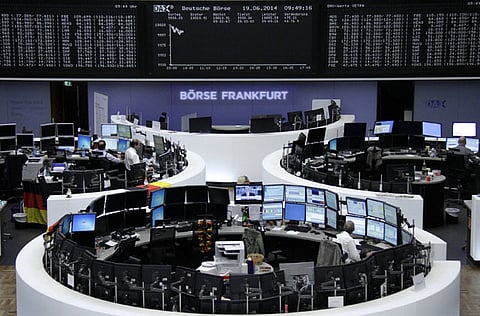Fed revives European stock rally; EDF tumbles
FTSEurofirst 300 up 0.7%, Euro Stoxx 50 up 1.1%

Paris: European stocks rallied on Thursday, with a blue-chip index near a six-year high, after the US Federal Reserve signalled that over the long run interest rates would be lower than it had previously indicated.
Bucking the trend, shares in French utility EDF sank 12 per cent after Energy Minister Segolene Royal said a five per cent tariff increase scheduled for Aug. 1 would not be applied.
The drop — EDF’s sharpest one-day slide since its market listing in 2005 — wiped out 5.8 billion euros ($7.9 billion) in market value — nearly the price of the latest-generation nuclear reactor EDF is building in Flamanville, France.
“It comes as a surprise for the market. We thought that the tariff hike was a done deal,” a Paris-based trader said.
At 1120 GMT, the FTSEurofirst 300 index of top European shares was up 0.7 per cent at 1,397.10 points. The euro zone’s blue-chip Euro Stoxx 50 index had risen 1.1 per cent to 3,316.36 points, a level not seen since mid-2008.
Late on Wednesday, the Fed said the US economy continued to recover and hinted it would raise interest rates slightly more next year than it had projected in March. But the central bank also lowered long-term projections for interest rates, evidence of diminished expectations.
“The overall tone was pretty dovish and the forecast for economic growth seems lower than expected, which is good for equities. Central banks continue to drive markets big time,” said David Thebault, head of quantitative sales trading at Global Equities.
Banking stocks were among the top gainers, with France’s Societe Generale up 1.9 per cent, Italy’s UniCredit up 1.7 per cent and Spain’s’ Banco Santander up 1.8 per cent.
The Euro Stoxx 50 Volatility index, Europe’s main “fear gauge”, tumbled 9 per cent to 12.6 — a level not seen since 2006.
The index, called VStoxx, is based on put and call options on the Euro Stoxx 50. It measures the cost of protecting stock holdings against market corrections and usually moves in the opposite direction to cash equities.
“There was a fear that the Fed would pick up more of a hawkish rhetoric, which they didn’t do,” Ioan Smith, director at KCG, said. “It was probably patience on their part, even after the uptick in inflation in May.” Around Europe, UK’s FTSE 100 index was up 0.8 per cent, Germany’s DAX index up 0.8 per cent, and France’s CAC 40 up 0.9 per cent.
Among the top gainers were shares in French car maker PSA Peugeot Citroen, up 4.8 per cent to near a three-year high. Bullish comments from the company’s chief financial officer at an Exane BNP Paribas conference fuelled the rally and sent hedge-fund short sellers scrambling to close bets the shares would fall.
“Peugeot is a nice recovery play,” said Isabelle Enos, deputy head of asset management at B*Capital. “The group’s recent capital increase went smoothly, there’s now much more visibility on governance and shareholding structure, and the icing on the cake is the recent pickup in car sales in Europe.” Earlier this year, Peugeot was among the most shorted stocks across Europe, with nearly 20 per cent of the company’s shares out on loan in February. But the level dropped to 4.3 per cent this week, according to data from Markit, while the stock price surged 40 per cent over the same period.
Short selling — a trading strategy popular with hedge funds — involves borrowing a security and selling it, betting that the price will fall. Short sellers then buy it back at a lower price and return it to the lender, pocketing the difference.
Sign up for the Daily Briefing
Get the latest news and updates straight to your inbox



